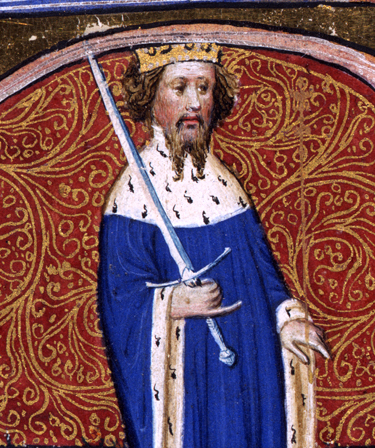Henry IV (c. April 1367 – 20 March 1413), also known as Henry Bolingbroke, was King of England from 1399 to 1413. He asserted the claim of his grandfather King Edward III, a maternal grandson of Philip IV of France, to the Kingdom of France. Henry was the first English ruler since the Norman Conquest, over three hundred years prior, whose mother tongue was English rather than French.[4]
Henry was the son of John of Gaunt, Duke of Lancaster, himself the son of Edward III.[2] John of Gaunt was a power in England during the reign of Henry’s cousin Richard II. Henry was involved in the revolt of the Lords Appellant against Richard in 1388, resulting in his exile. After John died in 1399, Richard blocked Henry’s inheritance of his father’s duchy. That year, Henry rallied a group of supporters, overthrew and imprisoned Richard II, and usurped the throne, actions that later would lead to what is termed the Wars of the Roses and a more stabilized monarchy.
As king, Henry faced a number of rebellions, most famously those of Owain Glyndŵr, the self-proclaimed ruler of Wales, and the English knight Henry Percy (Hotspur), who was killed in the Battle of Shrewsbury in 1403. The king suffered from poor health in the latter part of his reign, and his eldest son, Henry of Monmouth, assumed the reins of government in 1410. Henry IV died in 1413, and was succeeded by his son, who reigned as Henry V.
Accession:
After some hesitation, Henry met the exiled Thomas Arundel, former archbishop of Canterbury, who had lost his position because of his involvement with the Lords Appellant.[13] Henry and Arundel returned to England while Richard was on a military campaign in Ireland. With Arundel as his advisor, Henry began a military campaign, confiscating land from those who opposed him and ordering his soldiers to destroy much of Cheshire. Henry initially announced that his intention was to reclaim his rights as Duke of Lancaster, though he quickly gained enough power and support to have himself declared King Henry IV, imprison King Richard (who died in prison under mysterious circumstances) and bypass Richard’s 7-year-old heir-presumptive, Edmund de Mortimer, 5th Earl of March.[14]
Henry’s coronation, on 13 October 1399 at Westminster Abbey,[15] may have marked the first time since the Norman Conquest that the monarch made an address in English.



There are no reviews yet.